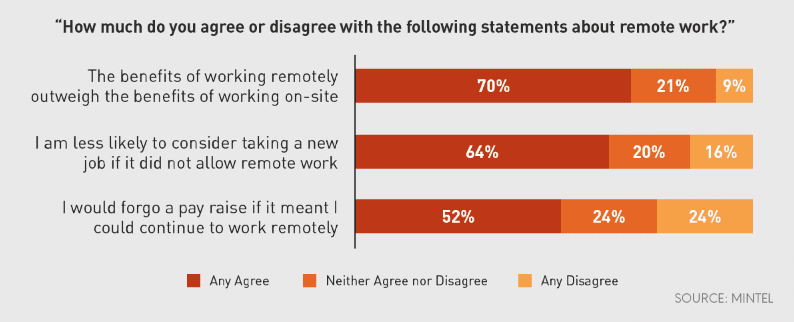When COVID-19 was declared a national emergency in March 2020, non-essential businesses were recommended to close, and people were instructed to stay home as much as possible to minimize the spread and contagion of the COVID-19 virus. Companies responded quickly to the pandemic, and if they were able to, moved to full-time remote work for their employees in order to keep working while keeping their employees safe and adhering to local safety measures.
Under normal circumstances, employers would never take the risk of moving their entire workforce to remote operations, due to the concerns of the impact of remote work on productivity, company culture, innovation and collaboration. However, these were far from normal circumstances, and many employers did not have a choice, it was “work remotely, or don’t work at all.” The hesitancy for such a dramatic change is well captured by Morgan Stanley CEO James Gorman on an April 2020 earnings call:
“If you’d said three months ago that 90% of our employees will be working from home and the firm would be functioning fine, I’d say that is a test I’m not prepared to take because the downside of being wrong on that is massive.”
Employers didn’t know what to expect from the massive shift to remote work for the majority of their employees, and businesses, especially large successful businesses, can be very risk-averse to such experiments. The COVID-19 pandemic changed that dynamic; companies needed to adapt in order to keep working, and concerns about productivity and work culture went out the window.
Employees are hesitant to relinquish newly gained remote work benefits
In the end, as James Gorman stated on Morgan Stanley’s April 2020 earnings call, most firms ended up functioning just fine, if not better, in a remote work environment. According to the report, Why Working from Home Will Stick, from the National Bureau of Economic Research, remote work arrangements have actually led to a 5% improvement in productivity after considering the benefits of not having a commute. Now that Pandora’s box has opened, it is impossible to close and employee’s priorities have shifted. Employers are starting to call employees back into the office, and instead of getting someone ready to work, they’re getting two-week notices. Apple, for example, announced it expects its employees to return to the office three days a week this upcoming September, a decision that has reportedly already resulted in employees quitting.
Companies should move very cautiously when making any decisions about a return to the office or future remote work arrangements. According to upcoming Mintel research on home office and classroom technologies, remote workers enjoy their current arrangements, 70% think the benefits of remote work outweigh the benefits of being in the office, and 64% are less likely to take a new job if it doesn’t include remote work. More than half would forego a pay raise in order to keep working remotely.
What we think
Work arrangements as we know it has changed. Companies that embrace remote work arrangements could see higher employee retention and better recruiting while saving money in the long run on overhead costs for office space. Employees may be less demanding on salaries if they can work remotely in a lower cost of living area. Companies that want to attract and keep the best employees must realize remote work arrangements will play a growing factor in where consumers decide to work. Brands and firms that do not embrace remote work could soon find their most talented employees making a change.


















![[LISTEN] Tech at Mintel: A Tech Leader’s Journey to Success and Inclusion](https://www.mintel.com/app/uploads/2023/08/Tech-at-Mintel-Sound-Waves-Podcast.jpg)






















